





Mulberry
Mulberry (it - a mulberry tree, or a mulberry) – high, to 20 meters a tree with white, red or dark-violet, almost black fruits stone fruit. The tree sacred and is thermophilic, berries ripen, depending on a growth area, in June-August. The countries of southwest and east Asia are considered as the homeland of a mulberry. Still the medieval Persian scientist, the doctor and Abu Ali ibn Xing's philosopher (Avicenna) devoted to advantage of a mulberry a whole chapter in "A canon of medical science" - work on which in the practice folk healers still rely. In ancient China on leaves and draws of a mulberry grew up silkworms.
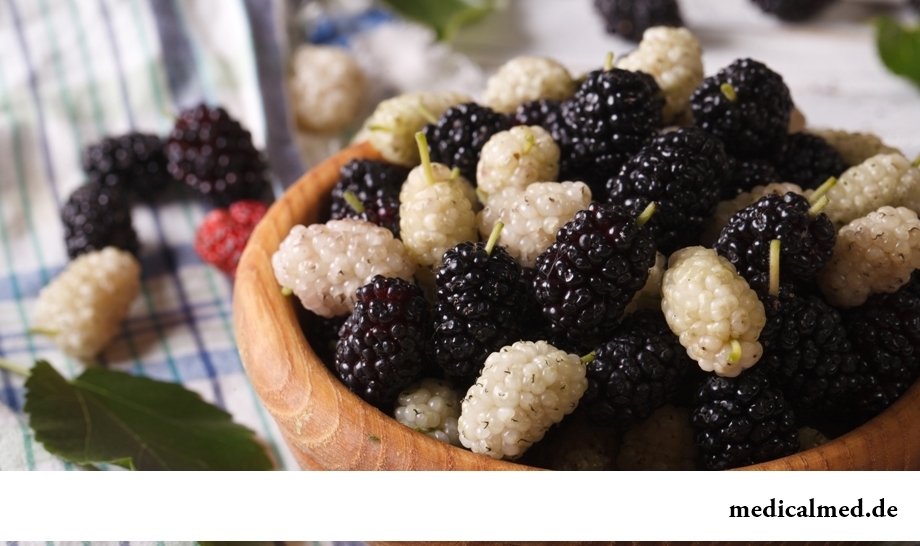
Today mulberries are cultivated as fruit-trees and as raw materials for cultivation of caterpillars of silkworms. Also leaves of trees go on a forage to the cattle, wood is used in the woodworking industry for production of musical instruments and souvenirs.
From berries of a black mulberry receive a food dye. It is clear, that from them it is very difficult to remove spots.
Because of resistance of mulberry trees to pollution of the atmosphere gases, smoke and dust, they are often used for gardening of large settlements.
Useful properties of a mulberry
Traditional medicine as raw materials uses a mulberry that is called "from top to toe" - from roots to kidneys and fruits as fresh, and in prepared (dried).
But particular interest, both with medical, and from the gastronomic point of view, mulberry fruits represent. They are rich with sugars (glucose, fructose), group B vitamins (including B3, or RR), ascorbic acid, vitamin K. In them essential oils, pectinaceous and tannins are also found in rather large number.
The mulberry in comparison with other berries contains a lot of potassium, calcium, phosphorus therefore the advantage of a mulberry in the menu in the period of intensive intellectual loading is not subject to doubt.
The average caloric content of hundred grams of a mulberry makes 43 kcal.
Use of roots, leaves and fruits of a mulberry
Juice of roots is a helminthicide, and their broth helps at bronchial asthma, catarrhal cough, heart troubles, a hypertension. At diseases of kidneys use bark of small and average branches. Outwardly powder from bark is applied at wounds and burns.
Juice from fresh leaves of a mulberry satisfies a dentagra, broths possess febrifugal and soothing action at catarrhal diseases. In official medicine leaves use as supportive application at treatment of initial forms of diabetes.
Broth from leaves can be applied to rinsing of hair for the purpose of giving of silkiness to them.
Depending on a look (white, red or black) and degrees of a maturity, property of a mulberry and its action on an organism can be various, up to opposite. So, the use of the green (immature) berries having the knitting properties promotes the termination of diarrhea, and the ripe and overripe fruits, on the contrary, poslablyat and therefore are useful at locks. Also mature fruits are the fine diuretic recommended at hypostases of a renal and cardiovascular origin. The red mulberry exerts positive impact on blood, white – on a nervous system.
Useful properties of a mulberry allow to recommend fresh berries to the people suffering from an anemia, gastrointestinal diseases (including, stomach ulcer and a duodenum), diseases of kidneys and a liver, a hypertension and gout. Juice and broth of fruits it is possible to rinse a throat at cold and various inflammatory diseases (earlier the mulberry was applied even at treatment of scarlet fever). Also, according to reviews about a mulberry, the use of its freshly squeezed juice protects from stomatitis and periodontosis.
Juice from berries of a white mulberry is good prophylactic of children's rickets. For the same purposes it is possible to use dried berries or thickened must – in a special way the condensed juice called still by "fruit honey". Both in thickened must, and in dried berries all curative properties of fresh fruits remain almost without loss.
Berries are very useful to the people having heart disease and a myocardial dystrophy. Reviews of a mulberry of patients with such diseases demonstrate that the regular use of a large number of fresh fruits reduces at them cardiac pains and short wind.
Infusion of ripe fruits is used at dyskinesia of biliary tract, and syrup from them is good sudorific.
The use of a mulberry promotes the decision as especially men's issues (fruits of a white mulberry help at prostatitis and impotence), and exclusively women's (berries apply at uterine bleedings and to simplification of a menopausal syndrome). The man who had "mumps" in the childhood has a probability of developing of infertility. That similar trouble it did not happen, recommended to feed daily during recovery boys with ripe berries of a mulberry.
Both white, and red, and especially black mulberry – tasty berry which can regale fresh, to use as a stuffing for pastries and vareniki, to do juice, to cook kissels and compotes. The mulberry is preserved, prepared from berries of jam and jams, syrup, a fruit candy and a water-ice. Dried berries pound in powder which then is added to pastries. From mulberry fruits, according to experts, very quite good wine and moonshine turn out.
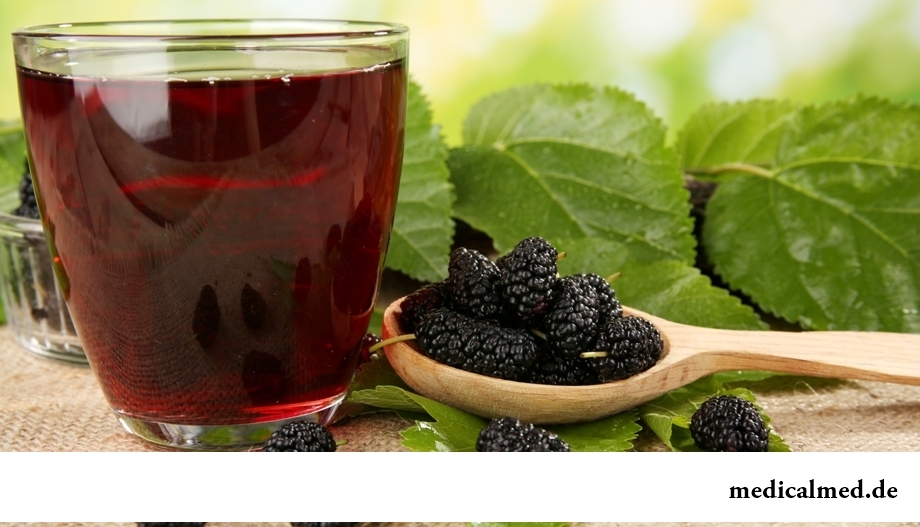
Fresh berries can be stored in the refrigerator no more than three days. Therefore the mulberry is unsuitable for transportation. However the advantage of a mulberry after drying and freezing remains almost invariable, in fruits enough vitamins and microelements remains fully to use the prepared berries in the distance from places of growth, and also for prevention and treatment of avitaminosis during the spring and winter period.
Contraindications
The main contraindication to the use of fruits of a mulberry is the individual intolerance. Because of high content of sugars in black berries (about 11%), the people suffering from a diabetes mellitus and obesity should not abuse them.
The mulberry from the trees growing along brisk highways should not be eaten.
According to researches, the women drinking several glasses of beer or wine in a week have the increased risk to develop breast cancer.

Cystitis, or inflammation of a mucous membrane of a bladder, this very widespread disease, which, owing to some persons...
Section: Articles about health
The metabolism at each person proceeds in own way. However between the speed of this process and disposal of excess weight after all all have a dependence. Unfortunately, the people inclined to try on itself numerous "miracle" diets, not always at...
Section: Articles about health
Season of activity of viral infections in the heat. Everyone can get sick, but probability of this unpleasant event it is possible and it is necessary to minimize. There is a number of rules, following to which will help or to avoid absolutely infection with flu or a SARS, or to have an illness benign and without essential complications. About ways of prevention of seasonal infections the speech in this article will also go....
Section: Articles about health
History of mankind contains several tens of epidemics whose emergence was compared by eyewitnesses and historians to doomsday. With...
Section: Articles about health
Statistically, in Russia about 34% of citizens smoke. Most of consumers of tobacco has problems with health sooner or later. Not only smokers, but also their relatives suffer. Besides, cigarettes are expensive, and need of their acquisition heavy bry...
Section: Articles about health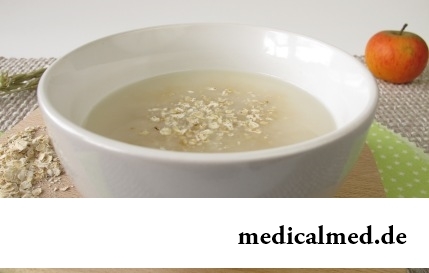
The main role in development of a peptic ulcer of a stomach and duodenum the bacterium Helikobakter plays pilor. Activity and the strengthened reproduction of this microorganism lead to weakening of protection of mucous membranes and their erosive damage. Displays of an illness seriously reduce quality of life: patients regularly test attacks of severe pain, heartburn, nausea. On this background also psychoemotional malfunctions develop: a kidney-vetch, as a rule, shows an acrimony, ча...
Section: Articles about health
Life of the modern child is extremely active and difficult. Information strain which is experienced by the school student and did not dream the pupil...
Section: Articles about health
From the failure of work of immune system which is shown in the form of an allergy, statistically, more than 40% of the population of the globe suffer. In most cases pathological reactions cause the substances which are contained in food stuffs, hair of animals, medicines...
Section: Articles about health
The word "onikhokriptoz" is unfamiliar to most of people, meanwhile quite so physicians call very widespread problem: the growing of edge of a nail into surrounding fabrics causing inflammatory process. Usually the illness affects thumbs of legs, and is followed by reddening, hypostasis, and in the started cases – release of pus. Patients complain of the pain amplifying when walking, problems with the choice of footwear....
Section: Articles about health
The unpleasant feelings connected with spring breakdown are familiar almost to each of us. Often happens that in March-April on the person...
Section: Articles about health
Cellulitis - very widespread cosmetic shortcoming which arises approximately at 80% of women sooner or later. Emergence it is connected with change of structure of a hypodermic fatty layer. At the same time on the surface of skin at first there are roughnesses (cambers...
Section: Articles about health
Popular joke that there are no healthy people, and is nedoobsledovanny, most of us considers an honest truth, continually it is necessary to hear that all of us are sick hardly from a school bench. It is hard to say whether so it actually because too often people are treated for nonexistent diseases, and sometimes call a disease what is something another. Sometimes in it the doctors of old school making diagnoses which are cancelled long ago – medicine still unless are guilty...
Section: Articles about health
The depression not without reason is considered one their main troubles of our century: for scientific and technical progress, acceleration of rate of life and a surplus...
Section: Articles about health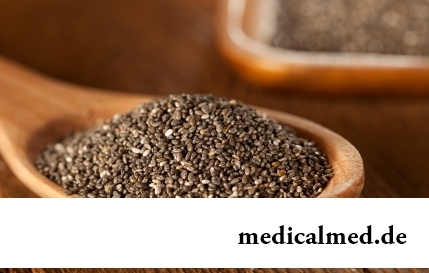
The chia plant, or the Spanish sage, is from South America. The indigenous people of the continent since ancient times used its seeds in food: small, but very nutritious kernels, in a form the reminding fasolina. Indians knew about useful properties of seeds of a chia, and applied...
Section: Articles about health
Smack in a mouth can arise in the natural way – as a result of lack of morning hygiene or reception of the corresponding food. However in certain cases its existence is a sign of certain pathologies, and allows to reveal an illness at an early stage. Depending on character of aftertaste – acid, salty, bitter, sweet – distinguish also diseases which accompany it....
Section: Articles about health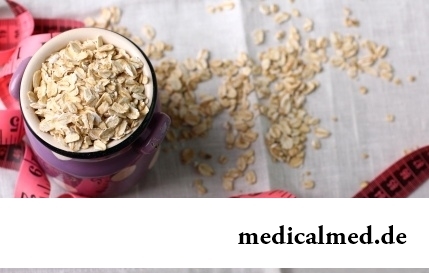
The list of stereotypes of which, apparently, all know strongly includes following: British surely eat for breakfast овсянк...
Section: Articles about health
80% of women at least once to lives complained of discomfortable feelings to breasts, consolidations and nagrubaniye. These are mastopathy symptoms. The mastopathy is characterized by change of a ratio between ferruterous and connective tissue tissues of mammary glands. It can bring...
Section: Articles about health
Each failure in work of bodies and systems of a human body is, as a rule, shown by the whole complex of symptoms. In particular, malfunctions with health often cause emergence of cosmetic defects in the form of rashes on a face. Experienced doctors know that localization of heat-spots usually depends on what disease the patient has....
Section: Articles about health
Since the moment when the child becomes a school student, his sight begins to be exposed to the strengthened loadings which are supplemented viewing...
Section: Articles about health
An eye of the person daily experiences considerable strain. The problem of preservation of sight is for many years directly connected with a question of supply of tissues of eye enough oxygen and nutrients. This task is carried out by small vessels – capillaries. For holes...
Section: Articles about health
Memory is an ability of the central nervous system to fix, keep and as necessary to reproduce information on knowledge or skills received by the person or an animal during life. The mechanism of this process is up to the end not studied....
Section: Articles about health
It seems, quite recently you brought the baby from maternity hospital, but time flew by, and here it is already going to join the first...
Section: Articles about health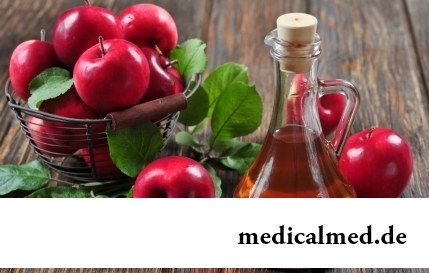
Not everyone can brag of the shining Hollywood smile. Even the person who is regularly visiting the stomatologist and watching of oral cavities over health periodically has problems: enamel of teeth darkens under the influence of some products, on it I accumulate...
Section: Articles about health
Beauty shop – the place which is associated only with positive emotions: joy, pleasure, relaxation. However visit of salon where work with biological material of clients, not always harmlessly is conducted. Today more than 100 pathogenic microorganisms who can catch in beauty shop including deadly to health are known....
Section: Articles about health
It would seem, about it there can be no disagreements: water is necessary for a human body for normal zhiznedeyatet...
Section: Articles about health
EKO, or extracorporal fertilization - a method of treatment of infertility which became the reason of a set of broken-down copies in due time accused the people working on its creation neither more nor less of rivalry good luck. Already very few people deny the rights...
Section: Articles about health
Radiological methods of a research are applied in medicine more than hundred years, and thanks to them millions of lives were saved. In many cases without X-ray it is impossible to make exact idea of a condition of bodies and fabrics, it is correct to make the diagnosis. Nevertheless, many myths about researches such continue to exist. Let's consider the most widespread of them....
Section: Articles about health
